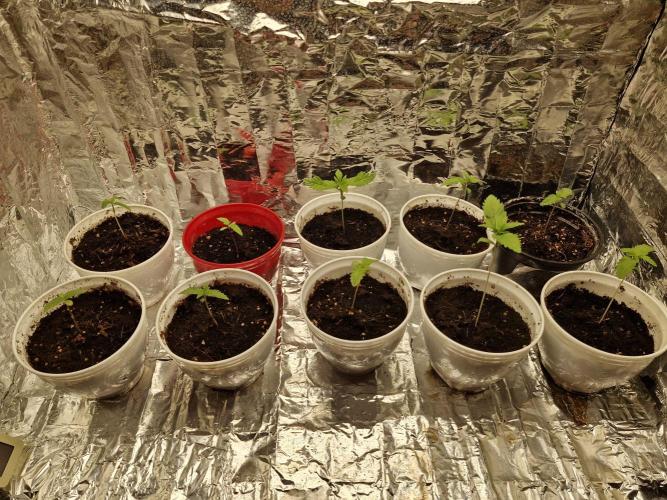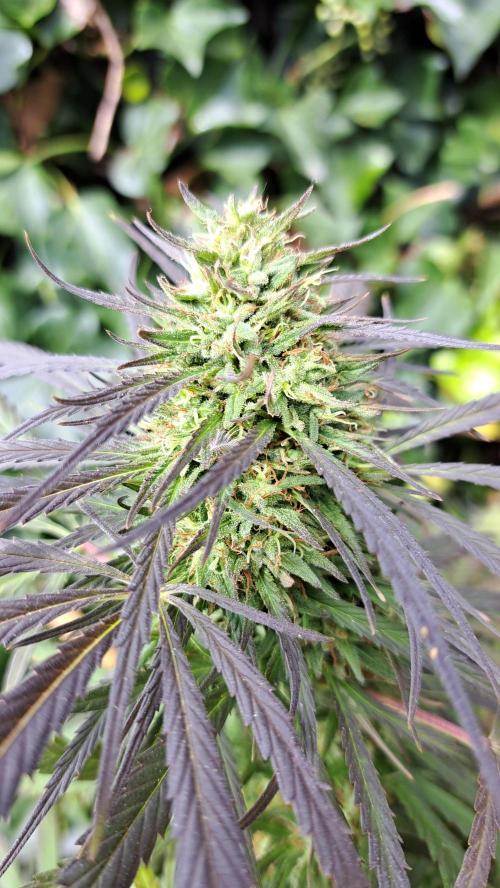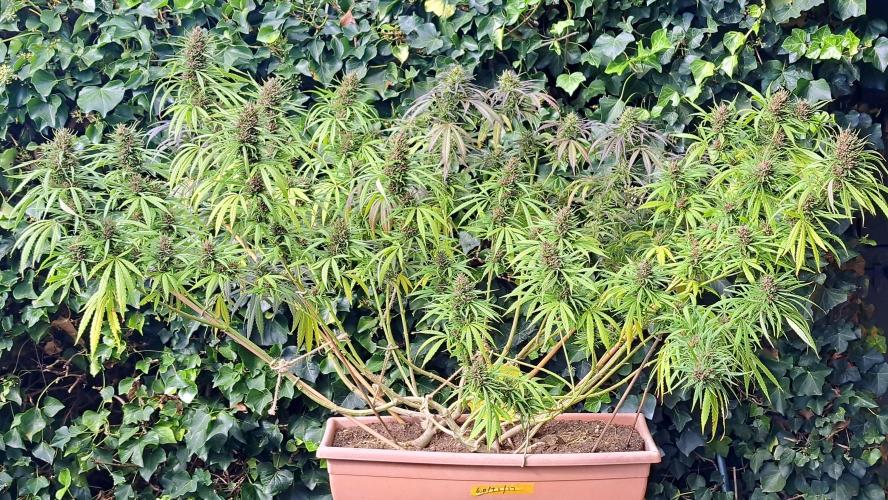By continuing to use the website or clicking Accept you consent to our cookies and personal data policy and confirm that you are at least 18 year old. For details please see Privacy Policy and Terms
Accept
Coloration differences
lowrydrstarted grow question 3d ago
Im curious...im growing nevilles haze outdoors from bag seed labeled as such, supposedly correct and unmixed with others. But flower and plant coloration are completely opposite even between 2 plants in the same box. Genetic variations or mixed with some other strain?
Solved
Buds. Other
likes
Selkotanswered grow question 3d ago
hey 👋
Don't worry, there's little chance of genetic mixing;
these are fairly common variations. It could also be due to differences in heat and ventilation in your room
enjoy!
00110001001001111Oanswered grow question 2d ago
genetic variety...
genetic recombination that occurs in meosis... sex gametes reproduce differently than other cells (mitosis vs meosis)
1 like
Complain
m0useanswered grow question 3d ago
you have your answer right here "im growing nevilles haze outdoors from bag seed labeled as such,"
Bag seed means you have no idea who "male/female/hermi" or what "strain/genetics" pollinated it, as it came from the bag you bought the weed in. Could it have been the same plant, maybe.... could it have been a different plant and strain that they where also growing.... also maybe. no one knows.
The lack of it being an intentional pollination means it is unknown and likely from a hermi or stressed plant end of life. the former usually being the case. Almost always bag seed is bunk and hermi's. There are expectations to this, example chemdog was grown out of a bag seed froma greatful dead concert. and tha lead to the famous OG Kush. My buddy grew out 15 bag seeds from different weed strains he picked up along his travels. Only one plant was a true female, and it was dog shit quality. about 4 where males and rest hermis, they fucked the one female and made more bastard seeds. On top of all this, seeds are siblings. no one brothers and sister are identical "excluding Id-twins" they take aspects from each parent, and with an unknown parent its bound to be different and should be expected.
Moral of the story. Don't grow bag seed unless you know the risks and are ok with a very low margin of success. Its much better use of your time to get reg/fem seed from a breeder/bank.
likes
Complain
Mrs_Larimaranswered grow question 3d ago
seeds are natures childs, strains got varations- and thats the fun part in my eyes
1 like
Complain
I_T_C_R_W___GROWanswered grow question 3d ago
its genetics:
like with your old classmates and brothers & sisters : They all are humans (same kind of plant).
But only when you have some from the same Family - they have the same parents - so brothers and sisters of the same parents - but even then they are not 100 % identical.
But from the same Family (like your Seed are from the same parents)
Even genetic twins (like Seeds) differ a bit in grow and form - while the gens of teh parents are the same. One Sister is 1.60m and one is 1.85m ....
When you need 100% identical plants you have go the way with clones,
where you cut parts from one plant to grow new plants from it ,
which then are 100% identical in the genetic Phenotyp of its Clone-Mother-Plant.
1 like
Complain
Ultravioletanswered grow question 3d ago
A plant's entire genetic blueprint (genome) is largely the same in every cell, but its traits and characteristics (phenotype) arise from a complex process where genes are turned on or off in specific cells at certain times, often in response to the environment. Instead of a fixed outcome, the genetic code serves as a set of instructions that can be influenced by environmental factors, developmental stages, and cellular needs, allowing plants to adapt and express different traits from the same underlying DNA.
There will always be a element of "rng" (random number generator), meaning randomness or chance, is a fundamental component of genetics due to random mutations, genetic drift, and the meiosis process that ensures a unique combination of genes in offspring. While natural selection acts non-randomly on these variations, the initial source of genetic diversity is random, shaping the genetic makeup of populations over time.
1 like
Complain
Similar Grow Questions
Solved

tototerremoto
Bad (stale water/rotten egg) smell?The smell of the buds is weird... It is like stale water, a bit like rotten. No yellow leaves or wilting, stem seems firm. The branches have stopped growing but the buds keep developing. Yesterday I flushed and let it drain, no improvement. Any ideas? Thanks a lot!!Week 6
Buds. Other
5y ago
2
3
Solved

Sikem2k11
Good weight???Will I still get good weight from 3 stardawg cuttings under a 600w light , being fed water no added nutrients I switched them 12 days ago, they look healthy got a few 3 fingered leaves , they have started to flower niceley. do you guys think please get back to me !!!!Buds. Other
5y ago
1
2
Solved

RatmanJR
Is it normal for bud sites to develop this low to the base?Buds growing very close to base.Never seen this before and I only caught it because I was removing the crumbling bottom leafs that haven’t gotten light in two weeks. These aren’t where normal popcorn buds grow, is this a strain thing? They will not get any light, should I remove?
Week 7
Buds. Other
5y ago
8
4
Solved

farah4weed
Hello, I am currently on day 12 of growth Do you think I should use any other fertilizer besides root fertilizer? Thank you for your comment.Hello, I am currently on day 12 of growth
Do you think I should use any other fertilizer besides root fertilizer?
Thank you for your comment.
Buds. Other
1mo ago
6
6
Solved

LesClaypool_777
Ready to cut her down? Or wait? Either way she bout ready!So my first girl is days maybe a,week away from pistols, & tricomes being in harvest window. I know 85-90% pistol is what im looking for, but what if its a few days/aweek early? THC will not be at most, but can curing make up? I ask because last batch was too dry,(temp, and coldWeek 18
Buds. Other
4y ago
2
3
Solved

loganchan
defoliate small buds?how much of the smallest flowers are generally defoliated?
Week 15
Buds. Other
3y ago
3
Solved

Hilltopflop
Gods vaginaNearly at the finish line 3 more weeks exciting time stinks like gods vagina
Week 14
Buds. Other
4y ago
2
2
Solved

cpavan
Re-vegg auto in bloom periodGuys,
Someone already had an autoflower that re-vegg in middle of flowering period?
I broke the “dark” time because I’m dumy, the plants start re-vegg and as my plants are auto I don’t know what do. The light time was 20/4 but I change to 18/6. Can you help me?
Buds. Other
5y ago
1
2
Solved

MonkeyDonkey
Harvest time delayed ? (had ph problems)Same seeds, same procedures (taller one has less soil due to mistake in beginning), very different results. Flush em? Harvest the smaller one? Its white hairs are pretty much brown, but not much ice there. The taller one has much more ice, but the white hairs are mainly white
Buds. Other
5y ago
1
1
Solved

TheUk420Show
Over 10 years of growing and somehow I've ended up with ditch weed ? quite disappointing temps got a bit high and an overfeed did occur which was sorted quickly yet no thc development on buds hardly any trichomes is it possible I just got a bad seed ? this is the worst I've done.
Week 21
Buds. Other
1y ago
2
7




























